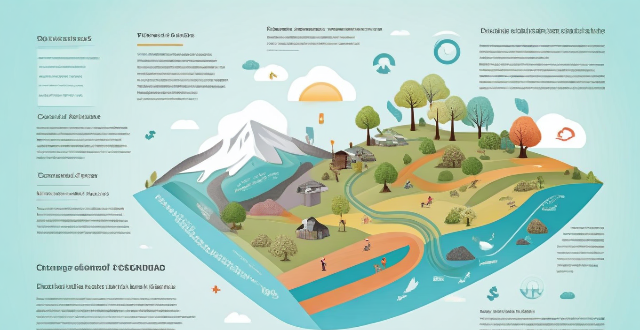Principle Change

Can ESG principles help mitigate climate change ?
ESG principles, which stand for Environmental, SocialESG principles, which stand for Environmental, Social, have become increasingly important in These principles aim to encourage companies to operate in a more sustainable and socially responsible manner. In this context, it is worth exploring whether these principles can help mitigate climate change. The environmental aspect of ESG focuses on reducing the negative impact of business operations on the environment. This includes reducing greenhouse gas emissions, conserving natural resources, and minimizing waste generation. By promoting these practices, ESG principles can contribute to mitigating climate change in several ways: * Reducing Carbon Emissions: Companies that prioritize environmental sustainability are likely to reduce their carbon footprint by using renewable energy sources, improving energy efficiency, and investing in low-carbon technologies. This can help lower global greenhouse gas emissions, which are a major driver of climate change. * Conserving Natural Resources: By promoting sustainable resource management, ESG principles can help reduce deforestation, protect biodiversity, and conserve water resources. These actions can help maintain the health of ecosystems that play a crucial role in regulating the Earth's climate. * Minimizing Waste Generation: Encouraging companies to adopt circular economy models and reduce waste generation can help reduce the amount of greenhouse gases produced during waste disposal processes. Additionally, recycling and reusing materials can help conserve natural resources and reduce the need for new raw material extraction, further contributing to climate change mitigation. The social aspect of ESG focuses on promoting fair labor practices, human rights, and community involvement. While these principles may not directly address climate change, they can indirectly contribute to mitigating its effects by fostering a sense of corporate responsibility and encouraging companies to invest in their communities. This can lead to increased awareness and action around climate change issues, as well as support for policies and initiatives aimed at addressing the problem. The governance aspect of ESG emphasizes transparency, accountability, and ethical behavior within a company's management structure. By promoting good governance practices, ESG principles can help ensure that companies are held accountable for their environmental impact and are more likely to adopt sustainable business strategies. This can lead to increased transparency around carbon emissions reporting, better alignment between corporate goals and climate objectives, and improved stakeholder engagement on climate-related issues. In conclusion, ESG principles can certainly help mitigate climate change by promoting environmentally sustainable business practices, fostering a sense of corporate responsibility, and ensuring transparency and accountability within companies' management structures. However, it is important to note that these principles alone may not be sufficient to fully address the complex challenges posed by climate change. A comprehensive approach involving government policies, international cooperation, and individual actions will also be necessary to achieve meaningful progress in mitigating the effects of climate change.

What is climate ethics and why is it important in today's world ?
Climate ethics is a branch of philosophy that examines the ethical implications of human activities contributing to global warming and explores ways to mitigate its effects. It matters because it addresses the fundamental question of how we should live our lives and interact with the environment to ensure a sustainable future for all. Key principles of climate ethics include the precautionary principle, intergenerational solidarity, environmental justice, sustainable development, and common but differentiated responsibilities. By embracing these principles and taking action based on them, we can work towards creating a more just, equitable, and sustainable world for all.

Can you explain the concept of "common but differentiated responsibilities" in climate change negotiations ?
The concept of "common but differentiated responsibilities" (CBDR) is a fundamental principle in international climate change negotiations. It recognizes that all countries have a shared responsibility to address climate change, but also acknowledges that the responsibilities of each country should be differentiated based on their respective contributions to the problem and capacities to respond. Key points include the recognition of common responsibility for all countries to protect the global environment and address climate change, and the differentiation of specific responsibilities based on factors such as historical contributions to greenhouse gas emissions, level of development, and capacity to adapt and mitigate the impacts of climate change. This principle is central to international climate change negotiations and is reflected in key agreements such as the United Nations Framework Convention on Climate Change (UNFCCC) and the Paris Agreement.

What are the key principles of environmental ethics ?
The text introduces the concept of environmental ethics, which is a branch of philosophy focusing on the moral relationships between humans and the natural environment. It outlines key principles such as respect for nature, sustainability, precautionary principle, intergenerational equity, biodiversity conservation, ethical consumption, ecological justice, holistic thinking, stewardship, and education and awareness. These principles serve as guiding lights in promoting an ethical relationship with the environment, aiming to create a more sustainable and equitable world.

What are the ethical implications of climate change and how can we address them ?
Climate change has significant ethical implications affecting nature, justice, and future generations. The discussion explores these dimensions and suggests strategies to address them, including respecting nature, ensuring intergenerational equity, promoting justice in climate action, and implementing policy initiatives, technological innovations, and social change to mitigate climate impacts.

Can you explain the working principle of a flow battery for energy storage ?
Flow batteries are a type of rechargeable battery that store energy in two chemical solutions pumped past an ion-exchange membrane. Key components include electrolyte tanks, pumps, and the cell stack. During charging, electrical energy is converted into chemical energy by moving ions across the membrane, storing them as potential gradients. Discharging reverses this process to generate electricity. Flow batteries offer scalability, decoupling of power and energy, long lifespan, and good efficiency but face challenges like cost, maintenance, and size. They are suitable for large-scale energy storage applications.

How can we ensure that climate change adaptation measures are equitable and just ?
The topic of ensuring equitable and just climate change adaptation measures is crucial for protecting vulnerable communities, avoiding inequality amplification, and promoting sustainability. Key principles include prioritizing the most vulnerable, transparency and public participation, equitable resource allocation, legislative and policy support, capacity building and education, and international cooperation. Implementing these principles involves assessment and planning, integration with development goals, and monitoring and evaluation. By following these guidelines, we can ensure that adaptation measures are fair and just for all.

How do climate change negotiations tackle the issue of climate justice ?
Climate change negotiations address the issue of climate justice by recognizing the disproportionate impacts on vulnerable populations, promoting equitable access to resources and technologies, adhering to the principle of common but differentiated responsibilities, ensuring inclusivity in negotiation processes, addressing loss and damage, promoting sustainable development, setting long-term goals and ambitions, and maintaining accountability. These efforts aim to create a more equitable and resilient global response to the challenges posed by climate change.

What are the key principles of climate justice ?
The text discusses the key principles of climate justice, which emphasizes fair and equitable solutions to climate change. The principles include: 1. **Recognition of Vulnerability** - Acknowledging that some communities are more susceptible to climate change's effects and prioritizing their needs in adaptation measures. 2. **Responsibility and Accountability** - Recognizing developed countries' disproportionate contribution to emissions and advocating for differentiated responsibilities in addressing climate change. 3. **Participation and Access to Decision-Making** - Ensuring all affected communities, including marginalized groups, have a say in climate policy decisions and promoting transparency. 4. **Protection of Human Rights** - Upholding rights to health, water, and food security, which are often threatened by climate change impacts. 5. **Intergenerational Equity** - Considering the rights and needs of future generations and advocating for sustainable development pathways. Overall, climate justice focuses on equity, human rights, and ethical treatment of people, especially those most affected by climate change.

How does the concept of common but differentiated responsibilities apply to global climate governance ?
The text discusses the application of common but differentiated responsibilities (CBDR) in global climate governance, a principle that recognizes varying obligations and actions required by countries based on their contributions to climate change, development levels, and economic and technological capabilities. Key aspects include historical responsibility, capacity to address climate change, differentiation in commitments, implementation through international agreements, financial mechanisms, technology transfer, and support for vulnerable countries. Challenges and criticisms include concerns about equity and justice, lack of clarity, and political will. The conclusion emphasizes the importance of CBDR in promoting an equitable and effective approach to climate change, while acknowledging the need for ongoing efforts to refine its application.

How do you control the speed and torque of an AC stepping motor ?
The text provides a comprehensive overview of controlling the speed and torque of an AC stepping motor, emphasizing the importance of understanding its basic principles and utilizing appropriate control techniques. Key points include the motor's working principle, torque generation, and step resolution, as well as various control methods such as pulse rate modulation, microstepping, closed-loop control, current limiting, voltage control, and soft start/stop. Practical considerations like drive system compatibility, thermal management, load factors, and safety precautions are also highlighted for optimal motor performance and longevity.

How does climate change affect education ?
Climate change impacts education through extreme weather events, health issues, food insecurity, economic challenges, social changes, and environmental degradation. These effects necessitate collaboration between educators and policymakers to develop resilient strategies for adapting to climate change.

What is climate debt ?
Climate debt is a concept that suggests wealthy nations owe a moral and ecological debt to poorer countries due to their disproportionate contribution to global warming. The idea is based on the principle of "common but differentiated responsibilities," which recognizes that all countries have a responsibility to address climate change, but the extent of this responsibility should be based on historical contributions and capacity to take action. Key points include historical responsibility, capacity to mitigate, and vulnerability and adaptation. Wealthy nations have been industrializing for longer and have more resources to invest in renewable energy, while poorer countries often lack the financial and institutional capacity to adapt to the impacts of climate change. Addressing climate debt is seen as an essential component of any equitable and effective response to the urgent challenge of climate change.

How is climate change affecting global temperatures ?
Climate change, largely due to human activities like burning fossil fuels and deforestation, is causing a rise in global temperatures. This has led to more frequent and severe extreme weather events, melting ice caps, ocean warming and acidification, changes in precipitation patterns, impacts on biodiversity, and challenges for agriculture. The situation calls for immediate action to reduce greenhouse gas emissions and adapt to the changing climate.

How does climate change impact national security ?
Climate change impacts national security in various ways, including economic disruption, social unrest, and political instability. To mitigate these effects, it is essential to take action at both the national and international levels, such as reducing greenhouse gas emissions, investing in renewable energy sources, and adapting to the inevitable changes brought about by climate change.

How can environmental ethics help address climate change ?
Environmental ethics, a branch of philosophy, examines the moral relationship between humans and nature. It helps in addressing climate change by recognizing nature's intrinsic value, promoting stewardship and sustainability, encouraging intergenerational equity, and fostering global cooperation.

How is climate change affecting the insurance industry ?
Climate change is significantly impacting the insurance industry by increasing natural disasters, altering liability exposures, and prompting regulatory changes. Insurers must adapt to these challenges by updating risk assessment models, complying with new regulations, shifting investment portfolios towards sustainability, and innovating products. This adaptation is crucial for insurers' financial resilience and their role in aiding societal adaptation to climate change.

What are the potential risks of climate change for the insurance sector ?
Climate change poses significant threats to the insurance sector, including increased natural disasters, changes in liability exposures, property value fluctuations, and regulatory/legal changes. Insurers must adapt by assessing risks, updating policies, and collaborating with governments to create effective strategies.

How does climate change impact social justice ?
Climate change has significant impacts on social justice, affecting marginalized communities, health outcomes, economic stability, migration patterns, and gender equality. Mitigation efforts to reduce greenhouse gas emissions and adaptation strategies to build resilience against the impacts of climate change are necessary to create a more equitable future for all.

What are the impacts of climate change on human health ?
Climate change affects human health in various ways, including increased heat-related illnesses, extreme weather events, changes in disease patterns, food and water security issues, and mental health impacts. It is important to take action to mitigate these effects and protect public health.

How can education help combat climate change ?
Education is a powerful tool in the fight against climate change by fostering awareness, promoting sustainable practices, stimulating innovation, and shaping policy. It empowers individuals to make informed decisions and advocate for environmental protection through comprehensive science education, applied learning experiences, interdisciplinary research, and civic engagement. By integrating sustainability into curricula and encouraging global perspectives, education prepares future generations to tackle the complex challenges of climate change effectively.

How does climate change affect consumer behavior ?
Climate change is affecting consumer behavior by increasing environmental awareness, changing shopping habits, driving a shift towards green energy, promoting sustainable food choices, and inspiring advocacy and activism. As consumers become more conscious of their impact on the environment, they are making changes in their purchasing habits to reduce their carbon footprint. Businesses that prioritize sustainability will be better positioned to succeed as consumers continue to make eco-friendly choices.

How effective has the United Nations Framework Convention on Climate Change (UNFCCC) been in addressing global climate change ?
The United Nations Framework Convention on Climate Change (UNFCCC) is a global treaty adopted in 1992 to stabilize greenhouse gas concentrations and prevent dangerous interference with the climate system. While it has achieved some successes, such as promoting international cooperation and establishing mechanisms for climate finance and technology transfer, its effectiveness has been limited by factors like lack of compliance and political will. To make a significant impact on global climate change, stronger commitment and concrete actions from all parties involved are necessary.

How does climate change affect water resources and availability ?
Climate change affects water resources and availability through melting glaciers, changes in precipitation patterns, sea level rise, increased evaporation rates, and impacts on ecosystems. These impacts can lead to water scarcity, flooding, contamination of freshwater sources, and declines in biodiversity. To mitigate these effects, it is important to reduce greenhouse gas emissions and implement adaptation strategies such as improved water management and conservation measures.

What is the impact of climate change on the global economy ?
Climate change affects the global economy in various ways, including reduced crop yields, water scarcity, forest fires, changes in energy production, human health issues, displacement and migration, and insurance and financial risks. Addressing climate change is crucial for both environmental and economic reasons.

How can climate resilience help mitigate the impacts of climate change ?
Climate resilience is a crucial strategy for mitigating the effects of climate change. It involves reducing vulnerability, enhancing adaptive capacity, promoting sustainable development practices, and fostering social cohesion. By implementing these strategies, communities can become more resilient and better able to cope with the impacts of climate change.